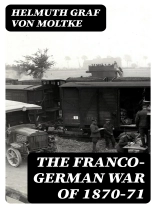In ‚The Franco-German War of 1870-71, ‚ Helmuth Graf von Moltke presents a meticulous and analytical account of a pivotal conflict that reshaped the landscape of modern Europe. The book reflects von Moltke’s deep military understanding and strategic acumen, employing a clear and structured narrative style that allows readers to grasp the complexities of military operations, diplomatic maneuvers, and social ramifications during the war. It places the conflict within a broader historical context, illuminating how nationalistic fervor and imperial ambitions contributed to the outbreak of hostilities between France and the newly unified Germany. Helmuth Graf von Moltke, a prominent Prussian general and Chief of the General Staff, played a crucial role in the war he chronicles. His firsthand experiences and strategic insights informed his portrayal of the conflict, providing readers with a unique perspective from a leader who was instrumental in orchestrating Germany’s military successes. Von Moltke’s meticulous planning and innovative tactics not only influenced the war’s outcome but also set the foundation for modern warfare theories. This book is essential for scholars, military historians, and anyone interested in understanding the intricacies of the Franco-German War. Von Moltke’s detailed analysis and firsthand accounts offer invaluable insights into the nature of war, diplomacy, and national identity, making it a compelling read for those who wish to comprehend the roots of contemporary Europe.
Über den Autor
Helmuth Karl Bernhard Graf von Moltke, commonly known as Moltke the Elder (1800–1891), was a distinguished Prussian Field Marshal and a seminal military theorist. He served as the Chief of the General Staff from 1857 to 1888 and is famed for his role in the unification of Germany. Moltke’s strategic genius was displayed during the Franco-Prussian War, with his theories on the decentralization of military command and the use of railways for troop movement shaping modern military tactics. His insights are compiled in his pivotal work, ‚The Franco-German War of 1870-71‘ (Grosser Generalstab, 1874-1881), a comprehensive history and analysis of the conflict which solidified his legacy in the military canon. As a master strategist, Moltke’s emphasis on detailed planning, flexibility, and the element of surprise has left an indelible mark on military thought. Scholars often contrast his theories with those of his contemporaries, noting Moltke’s influence on 20th-century military doctrine. His literary contributions offer a lens into the intellectual fabric of 19th-century military leadership, reflecting the rigorous Prussian military tradition and its impact on warfare.












